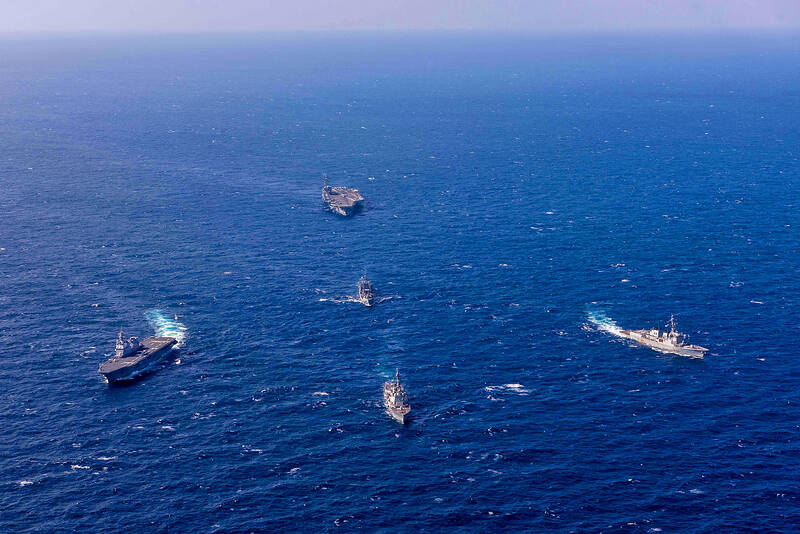The nuclear-powered aircraft carrier USS Ronald Reagan is due to dock at the South Korean port of Busan tomorrow, as Seoul warned of a greater threat from North Korea and held joint maritime drills with the US and Japan.
The carrier, which is expected to remain in Busan until Monday next week, would strengthen the defense posture of South Korea and the US in case of any North Korean provocations, the South Korean Ministry of National Defense said.
The Ronald Reagan last visited South Korea last year for the first time in about four years, joining other military vessels in a show of might intended to send a message to North Korea.

Photo: AFP / South Korean Ministry of National Defense
North Korean state media KCNA yesterday criticized the deployment of US strategic assets, including submarines and bombers, in the Asia-Pacific region, while defending its plans for a spy satellite program as “indispensable.”
Pyongyang has twice failed to place a spy satellite in orbit, in May and August, and has vowed to try again as early as this month.
South Korean Minister of National Defense Shin Won-sik told reporters yesterday that South Korea faces a more severe threat from North Korea, Yonhap news agency reported.
The visit of the carrier comes after the US pledged to enhance the “regular visibility” of its strategic military assets in the Washington Declaration, which South Korean President Yoon Suk-yeol and US President Joe Biden issued during a summit in April.
The South Korean and US navies held joint maritime drills with Japan’s Self-Defense Forces in waters near South Korea’s Jeju Island on Monday and yesterday, the South Korean Navy said.
The drills, which are the first of their kind since 2016, are aimed at deterring and responding to North Korea’s “advancing nuclear and missile threats,” the navy said in a statement.
A meeting was also held on the Ronald Reagan on Sunday, attended by South Korean Fleet Commander Vice Admiral Kim Myung-soo and his US and Japanese counterparts, to discuss countermeasures to Pyongyang’s “underwater threats,” as well as its nuclear and missile programs.

INVESTIGATION: The case is the latest instance of a DPP figure being implicated in an espionage network accused of allegedly leaking information to Chinese intelligence Democratic Progressive Party (DPP) member Ho Jen-chieh (何仁傑) was detained and held incommunicado yesterday on suspicion of spying for China during his tenure as assistant to then-minister of foreign affairs Joseph Wu (吳釗燮). The Taipei District Prosecutors’ Office said Ho was implicated during its investigation into alleged spying activities by former Presidential Office consultant Wu Shang-yu (吳尚雨). Prosecutors said there is reason to believe Ho breached the National Security Act (國家安全法) by leaking classified Ministry of Foreign Affairs information to Chinese intelligence. Following interrogation, prosecutors petitioned the Taipei District Court to detain Ho, citing concerns over potential collusion or tampering of evidence. The

Seventy percent of middle and elementary schools now conduct English classes entirely in English, the Ministry of Education said, as it encourages schools nationwide to adopt this practice Minister of Education (MOE) Cheng Ying-yao (鄭英耀) is scheduled to present a report on the government’s bilingual education policy to the Legislative Yuan’s Education and Culture Committee today. The report would outline strategies aimed at expanding access to education, reducing regional disparities and improving talent cultivation. Implementation of bilingual education policies has varied across local governments, occasionally drawing public criticism. For example, some schools have required teachers of non-English subjects to pass English proficiency

‘FORM OF PROTEST’: The German Institute Taipei said it was ‘shocked’ to see Nazi symbolism used in connection with political aims as it condemned the incident Sung Chien-liang (宋建樑), who led efforts to recall Democratic Progressive Party (DPP) Legislator Lee Kun-cheng (李坤城), was released on bail of NT$80,000 yesterday amid an outcry over a Nazi armband he wore to questioning the night before. Sung arrived at the New Taipei City District Prosecutors’ Office for questioning in a recall petition forgery case on Tuesday night wearing a red armband bearing a swastika, carrying a copy of Adolf Hitler’s Mein Kampf and giving a Nazi salute. Sung left the building at 1:15am without the armband and apparently covering the book with a coat. This is a serious international scandal and Chinese

TRADE: The premier pledged safeguards on ‘Made in Taiwan’ labeling, anti-dumping measures and stricter export controls to strengthen its position in trade talks Products labeled “made in Taiwan” must be genuinely made in Taiwan, Premier Cho Jung-tai (卓榮泰) said yesterday, vowing to enforce strict safeguards against “origin laundering” and initiate anti-dumping investigations to prevent China dumping its products in Taiwan. Cho made the remarks in a discussion session with representatives from industries in Kaohsiung. In response to the US government’s recent announcement of “reciprocal” tariffs on its trading partners, President William Lai (賴清德) and Cho last week began a series of consultations with industry leaders nationwide to gather feedback and address concerns. Taiwanese and US officials held a videoconference on Friday evening to discuss the